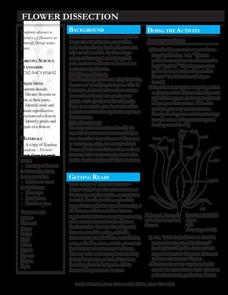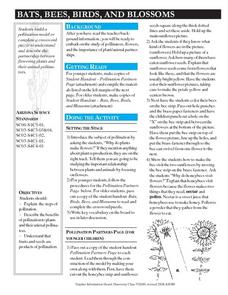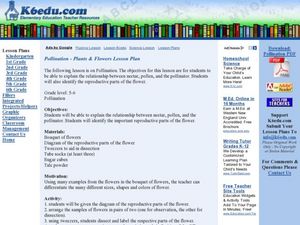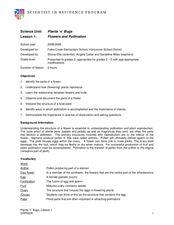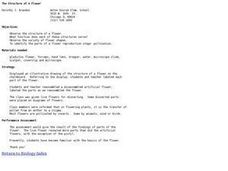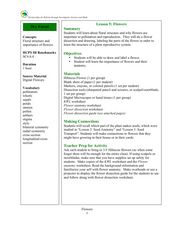Garden Earth Naturalist Club
Parts of a Flower! Flower Dissection
Sometimes the best way to learn about plants is to see the different parts of a plant yourself. Groups of learners dissect flowers to answer questions about what they observe and what they wonder about their flower.
Rural Science Education Program
Bees and Flowers – Partners in Pollination
Why are bees so important? After several activities where kids investigate the form and function of flowers, they learn about the different types of bees and label them. They then examine pollen under a microscope and decide which bees...
Curated OER
How Do Flowering Plants Reproduce
Students investigate how flowering plants reproduce. They identify and describe the functions of the major sexual organs of a flower and fruit by examining and dissecting flowers and fruit.
Curated OER
Flower Power
Young scholars explore parts of the flower. In this plant biology lesson, students dissect flowers and identify how the seeds are formed. Young scholars take a nature walk to pick flowers for future dissections.
Curated OER
Flower Dissection
Pupils investigate th anatomy of a flower. They investigate the structures and processes by which flowering plants generate pollen, ovules, seeds, and fruit through dissection,
Curated OER
Flower Power
Students explore the parts of flowers and how they reproduce. They dissect flowers and observe the reproductive organs. Students observe anthers and ovaries of Tiger Lilies under a microscope. They investigate how insects and other...
Curated OER
Flower Dissection
Beginning biologists pull a flower apart and familiarize themselves with the different reproductive structures. Why have them learn only from just a book or diagram when they can examine real samples? There is no link to the referenced...
Curated OER
Edible and Medicinal Plants: Field Trip Guide
Though it's designed to guide a field trip to the New York Botanical Garden, you could take resource like this one to a local park, wilderness area, school garden, or even a weedy empty lot. Middle schoolers identify plant parts and...
Curated OER
Bats, Bees, Birds, and Blossoms
Youngsters use a paper bee to pollinate two paper flowers. They use hole-punch dots as pollen. Older learners dissect flowers and name the structures involved in pollination. The handouts mentioned in the lesson plan are not included, so...
Curated OER
Plant Dissection
Students study plant parts and their functions in a dissection activity. In this plant dissection lesson, students use several handouts to help them learn parts of the plant and their functions. Students then dissect flowers in...
Curated OER
Pollination Power
Second graders study and examine the structure of a flower. In this pollination lesson, 2nd graders observe pollinators in the garden and dissect a flower. Students then plant strawberry plants in the garden and observe the process...
Curated OER
Pollination-Plants and Flowers Lesson Plan
Students study the reproductive parts and pollination for a flower. In this pollination lesson plan, students dissect flowers to perform an investigation. Students also use tube socks to show how pollination works. A diagram is included.
Curated OER
Plant Pollination
Students investigate methods of pollination for various flowers. In this plant biology lesson, students learn the parts of a flower and form a hypothesis about the method of pollination for the flower. They determine the validity of...
Curated OER
Plants And Pollination
Students describe sexual reproduction in plants, including the process of pollination, how insects assist in pollination, and how pollination differs from fertilization. They also explore the importance of honey bees to Arizona agriculture.
Curated OER
Flowers and Pollination
Students explore the environment by researching plant reproduction. In this pollination instructional activity, students define botany related vocabulary terms such as disc flower, petal and fertilization. Students dissect a flower with...
Science 4 Inquiry
Plant Structures Lab Stations
In China, hibiscus is known as the shoe flower because it is used to polish shoes, while in Hawaii, it is honored as the state flower. Young scientists learn about the structure and function of flowers. They dissect hibiscus...
Curated OER
"Five Little Seeds"
Fourth graders complete various activities related to the plant life cycle. They read the book "The Tiny Seed," read and discuss the poem "Five Little Seeds," complete a "Plantenstein Mystery" and other online activities, write and...
Curated OER
Learning the Parts of a Plant
First graders discover the anatomy of a plant by labeling a picture. In this botany lesson, 1st graders examine and dissect several real plants in class and define their different parts. Students utilize the Internet to view...
Curated OER
Life Cycles
Students explore the parts of a flower and pollination of flowers. In this plants lesson, students use an interactive whiteboard to label the parts of a plant and the functions of each part. Students complete a worksheet as an assessment.
Curated OER
The Structure of A Flower
Students study the structure of flowers. In this biology lesson plan, students observe the structure of a flower and find out what function each of the structures serve.
Curated OER
Flower Power
Students use video learning to explore how flowers make seeds and dissect their own flower, and make a flower with its reproductive parts out of construction paper.
Curated OER
Fun with Plants Flower Power
Students understand the parts of the flower. In this flower lesson, students perform experiments to see where seeds come from. Students complete a data sheet about the experiment. Students understand the terms pistil and stamen.
Curated OER
Dry Forest: Flowers
Learners explore botany by examining diagrams. In this plant reproduction lesson, students define a list of plant vocabulary terms and identify plant anatomy from a diagram. Learners complete several plant activity worksheets and study...
Curated OER
Plant Life
Seventh graders examine different categories of plant life and their roles as producers of food and oxygen for other organisms. They study the evolution of plants from simple organisms to very complex ones. They look at the different...








